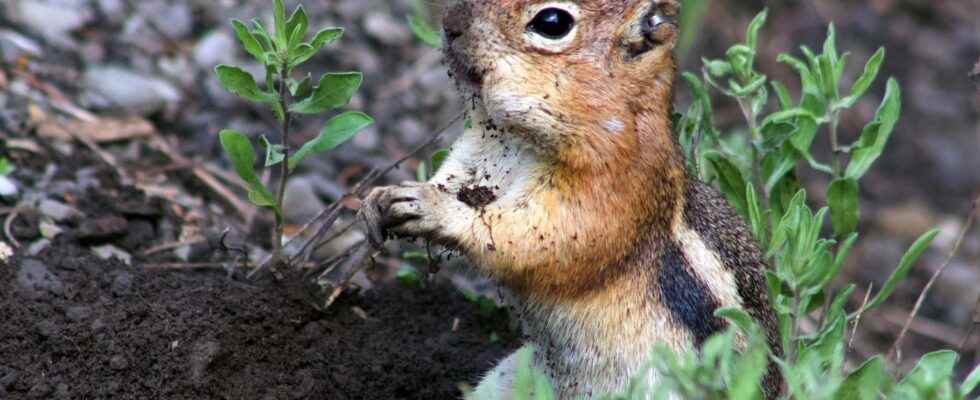“Bêtes de science” is like a collection of stories. Beautiful stories that tell the living in all its freshness. But also in all its complexity. A parenthesis to marvel at the treasures of the world. For this new episode, let’s meet a small animal that does not let itself be counted: the golden-mantled ground squirrel.
The ground squirrel at coat Golden. It’s a very strange name. For a rather strange little animal too. A kind of squirrel very cute with the bands he gate on his back. A little in the style chipmunk. But bigger – it measures up to 30 centimeters, but still weighs less than 400 grams – and without the scratches on the face. Without the very high-pitched voices of Alvin’s companions, either!
The golden-mantled ground squirrel lives in the forests of North America. And the least we can say is that he is not a very wild animal. The presence of Men does not scare him. He even dares to approach it very closely when he hopes to be able to collect some nuts to nibble on. On the other hand, when a predator such as lynx, fox or coyote appears, the little squirrel gives a cry of alarm. To allow his rare companions – he is not known for his sociability – to take refuge at the bottom of their burrow.
Squirrels aren’t the only rodents that surprise scientists. During an experiment, rats showed how much they enjoyed playing hide and seek with researchers. © Futura
Finally, to see the golden-mantled ground squirrels frolicking and fidgeting in the middle of the trees, stopping for some, starting again for others, we could almost indulge in imagining different personalities for them. Well, imagine that this is precisely what the researchers confirm! After observing them for over 30 years. And to have carried out some very innocent little experiments too.
This is because the test known as the Briggs Myers test does not apply to animals. It is used all over the world. To characterize the personality of a human being only. For animals, researchers must find other ways. For animals, because other than golden-mantled ground squirrels have already shown distinct personalities. Mammals as much as insects or fish. The researchers explain it by genetic or by different experiences or life strategies.
Ecological advantage or disadvantage?
To assess an animal’s personality, therefore, researchers usually place it in a new environment. The idea is to be able to observe how the animal will adapt, how much it will take risks or how frightened it will be when faced with a new object. Our golden-mantled ground squirrels have undergone four different tests. They were placed in a closed box with grid lines and holes. They were also put in the presence of a mirror in which they are not able to recognize their image. They were also approached slowly to determine after how long they fled. Finally, they were observed after being captured in a trap without risk to their life. Enough to bring out four personality traits: boldness, aggressiveness, level of activity and sociability.
If researchers are interested in animal personality, it is because they consider that it could have ecological consequences. Understand that a more daring animal, for example, or more aggressive, could find more food or appropriate a larger territory. Or perhaps, become more vulnerable to predators or even to accidents.
However, it appears that the most daring golden-mantled ground squirrels do indeed benefit from larger areas of activity. Bold and active squirrels move faster. The more daring, more aggressive and more active individuals also enjoy better access to perches. This is important, because perched on a rock, the little squirrel has a better point of view of its environment. It should therefore be able to better identify and escape predators. Note that access to perches is also favored among more sociable golden-mantled ground squirrels.
The study of the personality of animals is still in its infancy. But this area looks interesting. Notably because it could bring us a little closer to nature. Give birth toempathy for these animals which, decidedly, are not that different from us. And that is definitely … not so stupid!
Interested in what you just read?
.
fs11
